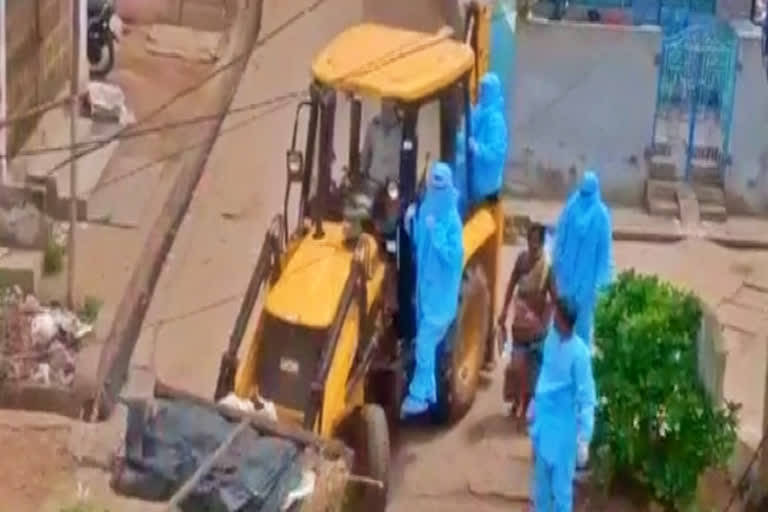New Delhi: With COVID-19 infection spreading across the nation, crematoriums and cemeteries are losing a battle against the increasing burden. Seeing a surge in the death toll, new temporary crematoriums are being established and authorities are trying to ensure that the existing ones work properly.
Apart from waiting at the crematoriums, families these days are facing the problem of unavailabilty of ambulances as they are playing the role of makeshift mortuaries. Bodies of COVID-19 patients have to be directly shifted from ambulances to the furnaces at the crematorium.
The constant changes in policies and guidelines on handling the dead bodies of COVID-19 patients, adds to the confusion among doctors, hospital authorities and families.
With some relaxation in the guidelines, the Union Ministry has allowed families to receive the bodies without waiting for laboratory confirmation of the infection.
How well are the Indian states prepared?
- Delhi:
The national capital has 13 cremation grounds, four graveyards and a cemetery managed by the civic bodies. Of these, six cremation grounds, four burial grounds and the lone cemetery have been dedicated for suspected or confirmed COVID-19 patients. The civic bodies have also added options of cremations as per COVID protocol at six new places in Mangolpuri, Inder Puri, Beri Wala Bagh, Wazirpur, Seemapuri and Ghazipur cremation grounds.
The three municipal corporations including South Delhi, East Delhi and North Delhi released a joint statement, stating that in view of the increasing number of COVID-19 cases, the corporations have increased the cumulative capacity of cremation to 95-100 bodies per day from their earlier capacity of 45 bodies per day across their crematoriums.
Read:| Telangana reports one COVID case every minute
A decision was taken by the all three corporations to allow cremation on wood pyres at Punjabi Bagh, Nigambodh Ghat, Panchkuiyan Road and Karkardooma cremation grounds, and electric cremation at Lodhi Road crematorium, with the increased capacity of about 20-22, 15-16, 08-10, 06-08 and 05-06 bodies respectively.
With the inclusion of the wood pyre facility for cremation, the cumulative capacity has gone up to 95-100 bodies per day from the earlier 45.
This is apart from the facilities available at four burial grounds and one Christian burial ground under the jurisdiction of the municipal corporations.
Among the five designated COVID-related cremation facilities in Delhi, the one at Punjabi Bagh is the only other that conducts both wooden-pyre and CNG/electric funerals. Here, a total of 480 cremations were conducted between 27 May and 7 June, an average of exactly 40 per day.
- Maharashtra:
Mumbai has 49 Brihanmumbai Municipal Corporation (BMC) run and 20 private crematoriums. BMC has prepared a dashboard for crematoriums across Mumbai, enlisting the 46 crematoriums and has also laid down SOP for the cremation of COVID patients. BMC has also issued a short tender for setting up 15 temporary mortuaries inside Hindu electric crematoria. Between April 2019 and March 2020, the electric crematorium in Bhandup had carried out 154 cremations. However, this year in May alone it has cremated 115 bodies. Of these, 89 succumbed to COVID-19.
- West Bengal:
The Kolkata Municipal Corporation started work on building two additional electric pyres at the Dhapa crematorium where people dying from COVID-19 are being cremated. Kolkata Municipal Corporation has also reserved two burial grounds and a crematorium for the last rites of COVID positive patients in the city.
- Karnataka:
Karnataka government has waived crematoriums fees for those who succumb to COVID-19 where the Bruhat Bengaluru Mahanagara Palike (BBMP) will bear the brunt of the cost.
Four crematoriums have been designated for COVID-19 fatalities by the Bruhat Bengaluru Mahanagara Palike (BBMP). BBMP had extended the timings of electric crematoriums to operate from 9 a.m. to 8 p.m. to prevent overcrowding, as it had become a common feature for ambulances carrying bodies to be seen queued up outside awaiting their turn.
Read:| COVID-19 recovered cases cross nine-lakh in India, fatality rate dips to 2.28 %
BBMP has designated one crematorium each in Rajarajeshwarinagar (Kengeri), Yelahanka (Medi Agrahara), Mahadevapura (Kudlu), and Bommanahalli (Panathur) as designated COVID-19 facilities. The BBMP has also said that the vehicles, the crematoria, and the equipment and materials used to transport the bodies must be sanitised, while the staff should be wearing PPE kits.
Technology overtaking traditions:
During the recent crisis, machines have replaced traditional methods. CPVID-19 has changed the Hindu tradition of cremating the dead. Earlier the dead were burnt on wooden logs preceded by few rituals by family members and priests but eventually, With just one relative present, the workers at electric cremation furnaces are forced to perform the rites themselves.
Amid COVID-19 outbreak, earthmovers have replaced grave diggers for the burial of bodies in Islamic tradition.
Applications have replaced the presence of priests at a touch. The poojas are also being conducted through video conferencing mode. The new start-ups are organising funeral ceremonies without the involvement of families while taking all necessary COVID-19 preventive measures. They provide the services of arranging death certificates, assembling a bier, transporting the body and even obtaining a crematorium pass.
Issues related to pandemic:
- The workers at cemeteries and crematoriums are not provided with adequate protective measures including PPE kits.
- Lack of staff increases fear
- lack of transportation facilities
- Lack of supervision over the burial and cremation
- Relatives and hospitals abandoning bodies
- The surge in COVID-19 fatalities results to lack of enough space for dead bodies
- People in huge numbers attending funerals without proper protection can further increase the cases of COVID-19.
- Huge waiting lines at cremation and burial grounds
- Lack of coronavirus awareness
Read:| Rajasthan: 25 members of same family test positive for coronavirus in Churu



